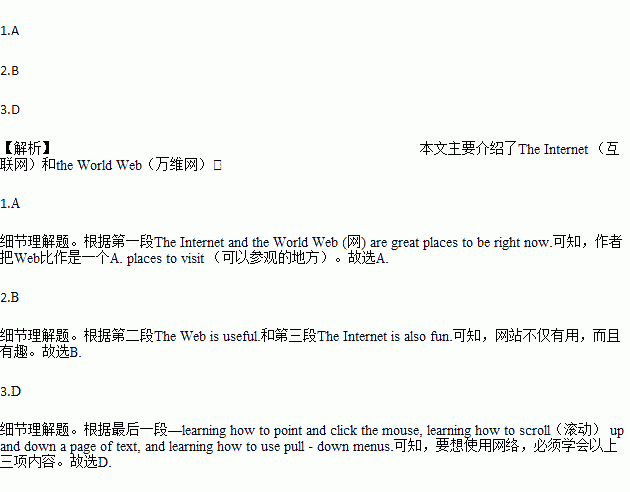题目内容
The Internet and the World Web (网) are great places to be right now. We use the word "place" because so many of the things you can do online are similar to the things you can do wherever people gather together-in homes , schools , libraries , shopping centers , or at family reunions(团聚)or town meetings. The Net allows people to learn shop, find important information, and communicate, whether they're local, global or simply virtual (虚的) .
The Web is useful. You can find old friends online. You can research and book flights, check the weather, find breaking news, find out information about schools and colleges. You can even place an order for books, CDs, computers and cars.
The Internet is also fun. You can write to old friends or check out their web pages, enjoy web - based soap operas, laugh at online jokes, join in a live Net Event, chat with other Internet surfers(漫游者) , check to see if your name appears anywhere on the Web .
Millions of users log on to the Net every day, and it's not just to do research. There's a lot of fun there. That's one reason why it's called web "surfing".
Of course, the first step to using the Web for business or for fun is learning how to work a "web browser"(浏览器). If you're new to computers, it may take a while before you are completely comfortable with your browser. Don't worry. You don't have to be a computer whiz(专家). The basics of a web browser are very much like the basics of modem computers
—learning how to point and click the mouse, learning how to scroll(滚动) up and down a page of text, and learning how to use pull - down menus. Again, be patient. There's no time limit on web surfing . Give yourself a chance to explore (探索) the browser itself while you explore the Web.
1.The writer compares the Web to ______.
A. places to visit B. places to gather together in
C. some easy job D. things you can do online
2.We can learn from the text that the Web is not only ______ but also
A. of great use; of great value B. of great use; of great enjoyment
C. useful; funny D. of some use; of a little interest
3.To use the Web, all we have to do is to learn how to_______ .
A. use the computer mouse B. scroll up and down a page of text
C. use pull- down menus D. all the above
 阅读快车系列答案
阅读快车系列答案
